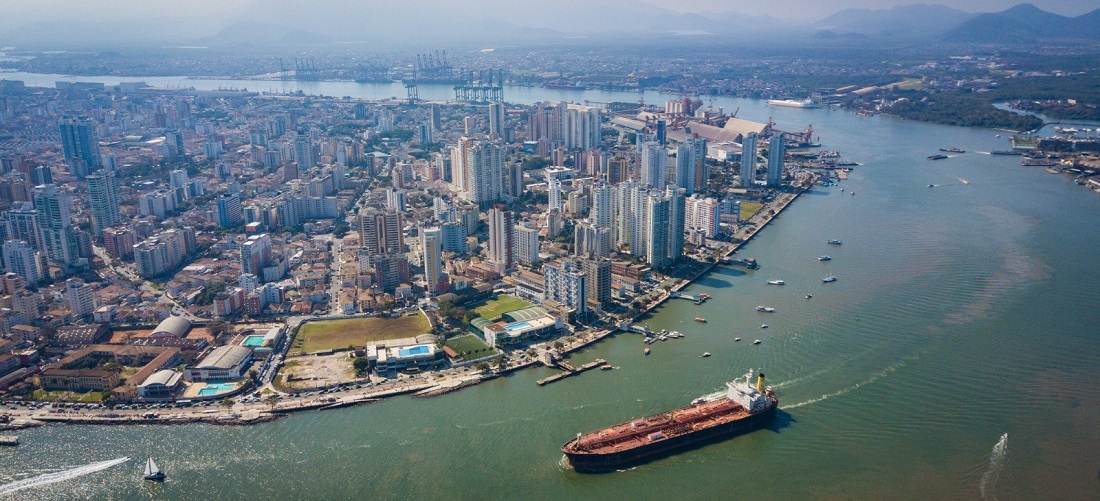
Legislative changes unlock increased utilization of Merchant Marine Fund for port sector
Aug, 17, 2023 Posted by Gabriel MalheirosWeek 202334
The Port of Santos is posited to be one of the main beneficiaries of the utilization of resources from the Merchant Marine Fund (FMM), created to promote investments in the Merchant Navy, the Brazilian shipbuilding and repair sector, and, as per the most recent legislation developments, leased and private terminals as well. The scope of the FMM’s operations was broadened by Federal Law 14,301/2022, known as BR do Mar, which modified the previous regulations laid out in Federal Law 10,893/2004.
Administered by the Ministry of Ports and Airports through the Board of Directors of the Merchant Marine Fund, chaired by Roberto Gusmão, the organization’s executive secretary, there are currently 237 projects currently using the Fund’s resources. Most of these projects, 94 to be exact, are in São Paulo.
Over the course of 12 years, from 2011 to 2023, R$ 89.8 billion were raised as FMM funds. Out of this amount, R$ 31.4 billion, equivalent to 35%, has been allocated. The Ministry itself acknowledges the relatively low utilization rate and indicates the potential for expanding the funding scope. The Ministry further underscores that all 907 contracted projects have been successfully completed, highlighting the considerable potential of these resources.
Addressing the change that transpired last year in the Merchant Marine Fund, port consultant Ivam Jardim notes that “the pivotal aspect, practically speaking, is the opportunity for financing ports and waterways.”
“A meticulous evaluation has been implemented to encompass well-developed and readily executable projects. Such a careful approach is crucial because once resources are committed and made available, it’s imperative that borrowers can access them promptly, generating gains in capacity, revenues, employment, and, consequently, a return on investment. This translates into the repayment of debt and the restoration of the federal government’s ability to fund new projects,” comments the port consultant.
Funding Origins
The primary funding source for the Supplemental Freight Charge for Renewal of the Merchant Marine (AFRMM). This tax is computed based on the value of water transportation, encompassing the sum of international freight and other charges outlined in the CE-Mercante, a fiscal control mechanism for maritime operations, comprising an electronically submitted bill of lading to customs authorities.
The following rates are applicable: 8% for long-haul navigation, 8% for cabotage navigation, 40% for river and lake navigation when transporting liquid bulk within the North and Northeast regions, and 8% for river and lake navigation when transporting solid bulk and other cargo within the North and Northeast regions.
“As an incentive, this serves as an avenue for investors to approach public banks, such as BNDES, to secure financing complete with a grace period of up to four years and a repayment span of up to two decades,” elucidates Jardim. “Unfortunately for the sector, a substantial portion of the allocated funds were withdrawn by the former Minister of Economy, Paulo Guedes, to bolster fiscal results, redirecting it to the National Treasury. It’s estimated that only R$ 6 billion remains available, hindering a more robust role from the Ministries of Ports and Airports and Finance in propelling major projects forward,” Jardim elaborates.
Fundable projects:
- Construction or production of cargo vessels, maritime support vessels, and vessels for other offshore activities (tugs and pushers), passenger transport ships, drillships, intended for fishing in operations contracted by Brazilian or foreign companies, particularly Brazilian companies in the shipping and shipyard industry.
- Production of vessels destined for export in operations contracted by Brazilian shipyards.
- Construction of auxiliary, hydrographic, and oceanographic vessels to be used in the protection of national maritime traffic in operations contracted by public entities, research institutions, and other bodies, including representatives of the merchant marine and shipbuilding sectors.
- Construction and repairs of auxiliary, hydrographic, and oceanographic vessels to be used in the protection of maritime traffic in operations contracted by non-dependent public companies linked to the Ministry of Defense.
Financeable Works:
Shipyards and Their Industrial Units:
- Construction, expansion, and modernization of shipyards and their industrial units, as well as Brazilian arsenals and naval bases in operations contracted by Brazilian shipyards.
Infrastructure:
- Execution of port and waterway infrastructure projects in operations contracted by Brazilian companies.
Others:
- Other applications for developing the Merchant Navy and the Brazilian shipbuilding and repair industry (pending issuance of regulations by the Board of Directors of the FMM) in operations contracted by Brazilian companies.
- Scientific or technological research and development projects, as well as training and improvement of human resources aimed at the sectors of the Merchant Navy, construction, or ship repair in operations contracted by Brazilian companies or entities.
Source: A Tribuna
To read the original news report, please visit: https://www.atribuna.com.br/noticias/portomar/com-maior-abrangencia-fundo-da-marinha-mercante-fomenta-investimentos-no-setor-portuario
-
Ports and Terminals
Feb, 21, 2024
0
Brazil miner Vale eyes more battery systems in its operations
-
Ports and Terminals
Jun, 05, 2024
0
Porto de Santos extends Ecoporto lease contract for 180 days
-
Ports and Terminals
Sep, 24, 2019
0
Port of Rio de Janeiro will have modern nautical signaling in access channel
-
Ports and Terminals
Nov, 11, 2020
0
Port of Itajaí submits feasibility study schedule to Ministry of Infrastructure


